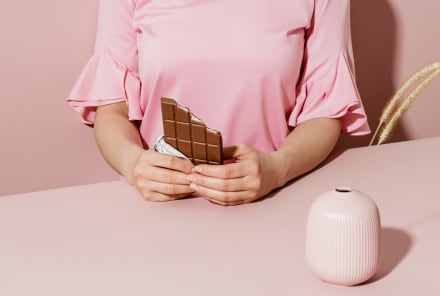Advertisement
Are Hormones To Blame For Your Lack Of Sleep?


While almost anything can cause insomnia, hormonal imbalances are a big reason for sleep disturbance. Hormone imbalances create vicious cycles—often triggered by underlying issues and then circling around to make those very same issues even worse.
"The first thing I always check is the adrenal glands (which produce cortisol, DHEA, and adrenaline)," says New York Tri-State Area doctor of naturopathic medicine Dr. Doni Wilson. "And then I check the gut, because stress causes leaky gut, and leaky gut causes inflammation that affects the nervous system." Knowing this, if you're having trouble sleeping it's important to look at the big picture and consider inflammation, your nervous system, and overall hormonal health. Here are ten hormone imbalances that could be jeopardizing your sleep:
1. Low progesterone
Sometimes referred to as "nature's valerian," progesterone calms the brain and decreases anxiety but declines sharply by the time a woman enters perimenopause.
2. Low estrogen
"Hot flashes keep you awake, but also know that when estrogen goes down, blood sugar can rise, leading to weight gain and wakefulness in the night," says Dr. Doni.
3. High cortisol
This "fight or flight" hormone inhibits ovaries, which can cause low estrogen and spike blood sugar. One of the best ways to manage cortisol is through stress management, so find what works for you: Walk the dog, garden, journal, read, listen to music.
"Any time you have stress, there's a crossover between the mind and hormones, which become triggers—in this case—for the neurotransmitter, adrenaline," explains Susan Blum, M.D., MPH, and founder and director of the Blum Center for Health. Adrenaline just adds to the already existing stimulation and keeps your brain and body awake at night.
4. Low cortisol
In moderation cortisol works as an anti-inflammatory and reduces pain, "but when the adrenal glands (where it's produced) give out, there is not enough to control inflammation," says Dr. Blum.
5. Low melatonin
Melatonin, known as the sleep hormone, helps regulate other hormones as well as our circadian rhythms—that "internal" clock we all have that determines when we fall asleep and wake. "Anything from a lack of light during the day to overexposure to light at night to leaky gut and nutritional deficiencies, can reduce it," says Dr. Doni.
6. Low DHEA
DHEA builds muscle and bone. Functional medicine physician, OB/GYN, and women's health expert Anna Cabeca, DO, FACOG, ABAARM, explains that "as an adrenal hormone, DHEA acts as an androgen and naturally declines as we age and are stressed. Low levels are associated with muscle weakness, and that includes your pelvic floor, possibly causing you to get up several times a night to urinate or making you prone to accidental leaks," she says.
7. Overactive or underactive thyroid
Naturopathic physician, acupuncturist, and president of the New York Naturopathic Physicians, Peter Bongiorno, ND, explains that the thyroid affects every cell in the body, including the brain receptors for serotonin—a brain chemical that affects sleep. "When the thyroid is overly active, it makes a person jittery, anxious, and sleep-deprived; when it's low, one will be fatigued, sluggish, and depressed." And depression often causes sleeplessness, so either way if there is a problem with your thyroid it can disrupt your sleep.
8. Leptin resistance
Usually, this hormone is one of the "good guys" because it regulates appetite and energy. It's possible, however, to produce too much, resulting in leptin resistance and making it impossible to lose your belly fat. "This visceral abdominal fat (VAT) causes body-wide inflammation," says Dr. Blum.
9. Low testosterone
There's a connection between low testosterone and sleep apnea in both women and men. Sleep apnea reduces REM sleep and creates low testosterone—which, in turn, creates more sleep apnea.
10. High androgen levels
Polycystic ovary disease (PCOS) is considered both a hormonal and metabolic disease. Women with PCOS have high levels of androgen hormones and there's a definite link between PCOS and sleep apnea.
In general, try to get enough sunlight and avoid using blue light-emitting electronics that stimulate the pineal gland. These can disturb melatonin production. "Taking magnesium, vitamin B6 and creating evening rituals all help to optimize sleep," says Dr. Cabeca. Women over 40 may also consider an evening progesterone cream supplementation. Her mantra, however, is "Test, don't guess," so concerns should always be discussed with your physician.


















